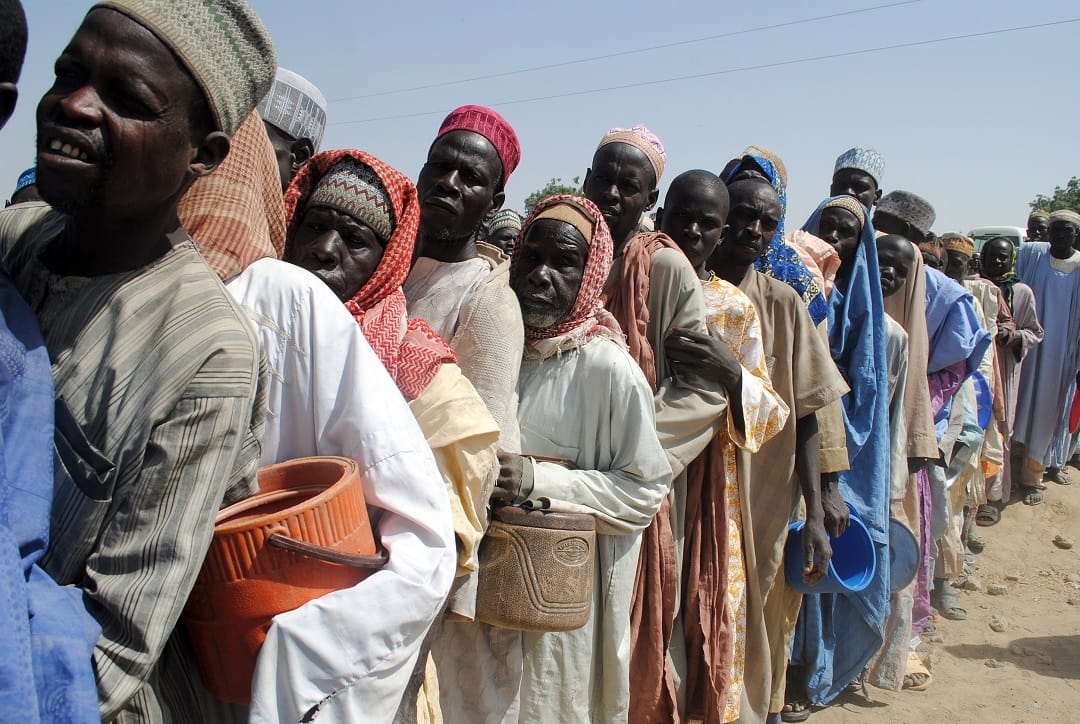Economy
HRW Accuses Borno Government of Harming Displaced Persons

By Adedapo Adesanya
The decision of the Borno State to shut down its camps for people displaced by the Boko Haram conflict has pushed over 200,000 people into deeper suffering and destitution, says Human Rights Watch (HRW).
In a new report, HRW said Borno State is harming hundreds of thousands of displaced persons already living in precarious conditions to advance a dubious agenda to wean people off humanitarian aid.
In the same breath, the group called on the state to stop closing camps until the authorities have had genuine consultations with the camp residents and other key actors and made adequate plans for them to resume their lives and livelihoods.
The 59-page report, Those Who Returned Are Suffering’: Impact of Camp Shutdowns on People Displaced by the Boko Haram Conflict in Nigeria, documents the effect of the shutdowns, which have disrupted food support for internally displaced people and compelled them to leave the camps.
The report noted that the government had not provided those removed with adequate alternatives, violating their rights to housing, food, and livelihoods.
It added that Nigerian authorities should recognize that the hasty closure of camps is sabotaging efforts to improve the lives of displaced people.
”The authorities have failed to provide adequate information or sustainable alternatives to ensure their safety and well-being. As a result, displaced people are struggling to meet their most basic needs, including food and shelter in the places which they have returned to or where they have resettled,” the report noted.
Speaking on this, Anietie Ewang, Nigeria researcher at Human Rights Watch and author of the report, said, “The Borno State government is harming hundreds of thousands of displaced people already living in precarious conditions to advance a dubious government development agenda to wean people off humanitarian aid.
“By forcing people from camps without creating viable alternatives for support, the government is worsening their suffering and deepening their vulnerability.”
The report showed that from May 2021 to August 2022, Borno State authorities compelled over 140,000 people to evacuate eight camps in the state capital, Maiduguri. Two other camps are also set to be closed this year, Muna Badawi and 400 Housing Estate (Gubio) Camp, housing a combined total of nearly 74,000 people.
Between April and September 2022, Human Rights Watch interviewed 22 internally displaced people, including 8 in either Dalori I or Gubio camps, as well as 14 who had left the Bakassi camp, which was shut down in November 2021. Those who left Bakassi camp sought shelter in Maiduguri or in Bama, their home community. Human Rights Watch also interviewed camp management officials, representatives of international humanitarian agencies, and United Nations officials coordinating assistance in Borno State.
Food support to the camps stopped soon after Borno State Governor Babagana Umaru Zulum announced in October 2021 that all camps in Maiduguri would be shut down by December 2021.
Although several remained open beyond that date, organizations, including the UN World Food Program, could not provide support because the slated shutdowns and funding gaps made it impossible to scale up their 2022 plans.
HRW noted that even though the Borno State Emergency Management Authority has provided some ad hoc food distribution, deliveries have been sporadic and insufficient to meet needs. It put forward that, based on its interviews, many people said they had been forced to skip meals or go for days without something substantial or nutritious to eat.
Economy
Strong Investor Sentiment Keeps NGX Index in Green Territory by 0.31%

By Dipo Olowookere
The Nigerian Exchange (NGX) Limited remained in the green territory on Wednesday after it rallied by 0.31 per cent on the back of sustained bargain-hunting activities by investors.
Business Post reports that all the key sectors of the market closed higher at midweek as a result of the renewed interest in local equities.
Data showed that the energy index appreciated by 2.59 per cent, the insurance space grew by 2.34 per cent, the industrial goods sector improved by 0.15 per cent, the banking counter expanded by 0.06 per cent, and the consumer goods industry rose by 0.04 per cent.
At the close of business, the All-Share Index (ASI) gained 302.71 points to settle at 98,509.68 points compared with Tuesday’s closing value of 98,206.97 points and the market capitalisation added N183 billion to close at N59.715 trillion versus the preceding day’s N59.532 trillion.
It was observed that the level of activity yesterday waned as the trading volume, value and number of deals decreased by 65.93 per cent, 49.22 per cent, and 12.70 per cent, respectively.
On Wednesday, a total of 320.1 million stocks valued at N6.5 billion were transacted in 7,943 deals, in contrast to the 939.4 million stocks worth N12.8 billion traded in 9,098 deals.
The busiest equity at midweek was eTranzact, which transacted 70.3 million units for N474.2 million, Universal Insurance traded 23.8 million units worth 8.1 million, Zenith Bank exchanged 21.2 million units valued at N933.5 million, FBN Holdings sold 18.6 million units worth N491.2 million, and UBA traded 14.0 million units valued at N465.8 million.
At the close of transactions, 34 shares ended on the gainers’ log and 17 shares finished on the losers’ chart, representing a positive market breadth index and strong investor sentiment.
Africa Prudential gained 10.00 per cent to quote at N14.30, Conoil also improved by 10.00 per cent to N352.00, and RT Briscoe expanded by 10.00 per cent to N2.42, as Golden Guinea Breweries jumped by 9.95 per cent to N7.18, while NEM Insurance grew by 9.74 per cent to N10.70.
However, Julius Berger lost 10.00 per cent to close at N155.25, Secure Electronic Technology shed 9.52 per cent to trade at 57 Kobo, Multiverse declined by 7.63 per cent to N5.45, Haldane McCall tumbled by 6.07 per cent to N4.95, and Honeywell Flour crashed by 5.62 per cent to N4.70.
Economy
Crude Oil Jumps as EU Slams Fresh Sanctions on Russia

By Adedapo Adesanya
Crude oil prices went up on Wednesday after the European Union (EU) agreed to an additional round of sanctions threatening Russian oil flows that could tighten global crude supplies.
During the session, Brent crude futures jumped by $1.33 or 1.84 per cent to $73.52 a barrel and the US West Texas Intermediate (WTI) crude futures rose by $1.70 or 2.48 per cent to $70.29 per barrel.
EU ambassadors agreed on a 15th package of sanctions on Russia over its war against Ukraine, targeting its shadow tanker fleet and Chinese firms making drones for the country.
The sanctions would target vessels from third countries supporting Russia’s war in Ukraine and add more individuals and entities to the sanctions list. It will not be adopted until after foreign ministers approve the package on Monday.
The shadow fleet has aided Russia in bypassing the $60 per barrel price cap imposed by the G7 on Russian seaborne crude oil in 2022 and has helped keep Russian oil flowing.
Prices were supported by the Energy Information Administration (EIA) which reported an estimated inventory decline of 1.4 million barrels for the week to December 6. In fuels, however, the EIA estimated sizable builds.
The crude oil inventory figure compares with a draw of 5.1 million barrels for the previous week that pushed prices higher for a while but the gains soon got erased by weak global demand growth prospects.
A day before the EIA, the American Petroleum Institute (API) had estimated inventory changes at a positive 499,000 barrels for the week to December 6.
Meanwhile, on Wednesday, the Organisation of the Petroleum Exporting Countries (OPEC) cut its 2024 global oil demand growth forecast for a fifth straight month and by the largest amount.
In its December report, the cartel expects 2024 global oil demand to rise by 1.61 million barrels per day, down from 1.82 million barrels per day last month.
OPEC also cut its 2025 growth estimate to 1.45 million barrels per day from 1.54 million barrels per day.
The 210,000 barrels per day cut in the 2024 figure is the largest of the five reductions OPEC has made in its monthly reports since August. In July, OPEC had expected world demand to rise by 2.25 million barrels per day.
Weak demand, particularly in top importer China, and non-OPEC+ supply growth were two factors behind the move.
Economy
Again, OPEC Cuts 2024, 2025 Oil Demand Forecasts

By Adedapo Adesanya
The Organisation of the Petroleum Exporting Countries (OPEC) has once again trimmed its 2024 and 2025 oil demand growth forecasts.
The bloc made this in its latest monthly oil market report for December 2024.
The 2024 world oil demand growth forecast is now put at 1.61 million barrels per day from the previous 1.82 million barrels per day.
For 2025, OPEC says the world oil demand growth forecast is now at 1.45 million barrels per day, which is 900,000 barrels per day lower than the 1.54 million barrels per day earlier quoted.
On the changes, the group said that the downgrade for this year owes to more bearish data received in the third quarter of 2024 while the projections for next year relate to the potential impact that will arise from US tariffs.
The oil cartel had kept the 2024 outlook unchanged until August, a view it had first taken in July 2023.
OPEC and its wider group of allies known as OPEC+ earlier this month delayed its plan to start raising output until April 2025 against a backdrop of falling prices.
Eight OPEC+ member countries – Saudi Arabia, Russia, Iraq, United Arab Emirates, Kuwait, Kazakhstan, Algeria, and Oman – decided to extend additional crude oil production cuts adopted in April 2023 and November 2023, due to weak demand and booming production outside the group.
In April 2023, these OPEC+ countries decided to reduce their oil production by over 1.65 million barrels per day as of May 2023 until the end of 2023. These production cuts were later extended to the end of 2024 and will now be extended until the end of December 2026.
In addition, in November 2023, these producers had agreed to voluntary output cuts totalling about 2.2 million barrels per day for the first quarter of 2024, in order to support prices and stabilise the market.
These additional production cuts were extended to the end of 2024 and will now be extended to the end of March 2025; they will then be gradually phased out on a monthly basis until the end of September 2026.
Members have made a series of deep output cuts since late 2022.
They are currently cutting output by a total of 5.86 million barrels per day, or about 5.7 per cent of global demand. Russia also announced plans to reduce its production by an extra 471,000 barrels per day in June 2024.
-

 Feature/OPED5 years ago
Feature/OPED5 years agoDavos was Different this year
-
Travel/Tourism8 years ago
Lagos Seals Western Lodge Hotel In Ikorodu
-

 Showbiz2 years ago
Showbiz2 years agoEstranged Lover Releases Videos of Empress Njamah Bathing
-

 Banking6 years ago
Banking6 years agoSort Codes of GTBank Branches in Nigeria
-

 Economy2 years ago
Economy2 years agoSubsidy Removal: CNG at N130 Per Litre Cheaper Than Petrol—IPMAN
-

 Banking2 years ago
Banking2 years agoFirst Bank Announces Planned Downtime
-

 Sports2 years ago
Sports2 years agoHighest Paid Nigerian Footballer – How Much Do Nigerian Footballers Earn
-

 Technology4 years ago
Technology4 years agoHow To Link Your MTN, Airtel, Glo, 9mobile Lines to NIN





















